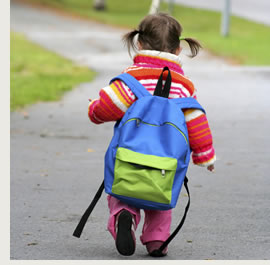|
|
||||
|
||||
| Pre-school education | ||||
| More reason to insist on pre-school education for all | ||||
|
Children in Australia start school at least a year later than most other developed countries, with compulsory attendance from age 6, but we still don't have compulsory and guaranteed pre-school education for all. If preschool education is compulsory, it should be an effective program that can be delivered either in pre-schools (which do already exist, but just aren't used extensively), and in long day care and family day care programs by trained early childhood educators. In some states pre-schools are run by the state and territory governments, but in Victoria, South Australia and New South Wales they are more often run by local councils, community groups or organisations, such as KU Children's Services. Pre-school is offered to three to five-year-olds; attendance numbers vary widely between the states, but 85.7% of children attended pre-school the year before school. The year before a child is due to attend primary school is the main year for pre-school education. This year is far more commonly attended, and may take the form of a few hours of activity during weekdays. In the UK children start school at 4, in Spain and France at 3 and while they aren't reading and writing essays in these early years, they are at least being given the early basics for formal education. Without a compulsory program are we failing our children by expecting them to go from zero to Naplan in just 4 years? While many argue there is no need to be schooling children at an early age and that they all catch up in the end, an interesting study in the USA has highlighted the huge importance of early education, giving further credibility to the belief held by many that investment in education should be equal if not more in pre-school age groups than in high school education. In the USA, as in most other developed countries around the world, public spending on higher education is more than three times as large as spending on preschool, according to O.E.C.D. data from 2009. A 2008 study on federal and state governments showed spending of more than $10,000 per child in kindergarten through 12th grade. But 3- to 5-year-olds got less than $5,000 for their education and care and children under 3 got $300. While many might think that spending is most important through school years, this notion was recently scrutinised by James Heckman, one of USA's top economists studying human development. Thirteen years ago, he shared the Nobel for economics and in February, he stood before the annual meeting of the Nebraska Chamber of Commerce and Industry, showed the assembled business executives a chart, and demolished the United States' entire approach to education with the results of cognitive tests that were first performed in the 1980s on several hundred low-birth weight 3-year-olds, who were then retested at ages 5, 8 and 18. Unsurprisingly children of mothers who had graduated from college scored much higher at age 3 than those whose mothers had dropped out of high school, proof of the advantage for young children of living in rich, stimulating environments. However, the very significant finding was that the difference in cognitive performance was just as big at age 18 as it had been at age 3. This showed that the years spent at school made no difference to a child's cognitive ability. "The gap is there before kids walk into kindergarten," Mr. Heckman told Eduardo Porter, a journalist for the New York Times. "School neither increases nor reduces it". Another study by Mr. Heckman and Flavio Cunha of the University of Pennsylvania found that the gap in math abilities between rich and poor children was not much different at age 12 than it was at age 6. Research by Mr. Heckman and others confirms that investment in the early education of disadvantaged children pays extremely high returns down the road. It improves not only their cognitive abilities, but also crucial behavioural traits like sociability, motivation and self-esteem. So it seems about time that the Australian government did something a bit more proactive about addressing the lack of pre-school education, making it both compulsory and available to all. Pre-school and pre-prep programs in Australia are relatively unregulated, and are not compulsory. The first exposure many Australian children have to learn with others outside of traditional parenting is either in child care or in a parent-run playgroup. While pre-schools exist and are on the increase, they are often not used by parents because they don't offer full day care (finishing at 2 or 3pm) and are therefore not suitable for working parents. Despite the social interaction this provides, this sort of activity is not generally considered schooling. So far the only state that has compulsory pre-school education is WA, where pre-school education is taught as part of the primary school system in a similar way to the set up in Europe. However it is thought that although there is almost 100% enrolment in pre-primary, attendance is sporadic and in many communities, especially rural, it's very hard to enforce. In 2007 the Council of Australian Governments (COAG) established a partnership between the Australian Government and the state and territory governments to encourage substantial reform in the areas of education, skills and early childhood development. In 2008, COAG endorsed a commitment to ensure that every child in Australia has access to a quality ECE program to ensure that by 2013, each child will have access to a preschool program:
So far this has only become compulsory in WA. |
||||
Share your views here
comments powered by Disqus
|
|
|||||||||

 Our recent
Our recent